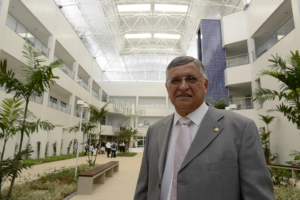NPDM
The Research and Development Center for Pharmaceuticals (NPDM) is affiliated with the Faculty of Medicine at the Federal University of Ceará (UFC) and features a multidisciplinary structure with the potential to promote and carry out scientific studies, service provision, technological development, innovation, and human resource training to meet the preclinical and clinical research needs necessary for the development of new drugs in the industry and in line with the policies and guidelines set by the National Health Surveillance Agency (ANVISA), Ministry of Health (MS), Ministry of Science, Technology and Innovation (MCTI), and the National Bank for Economic and Social Development (BNDES/MDIC).
History
The Center was inaugurated on February 2, 2015, after ten years of planning, and is coordinated by Prof. Dr. Odorico Moraes.
Rationale
Since the last decade, the global pharmaceutical market has been rapidly changing, forcing industries to improve competitiveness through investments in technology and innovation. Consequently, the discovery of new drugs and their development into health products has been occupying a significant space in the national pharmaceutical industry.
Due to the growing demand of these industries in the country, the Research and Development Center for Pharmaceuticals (NPDM) was conceived, bringing together existing competencies at the Federal University of Ceará with the aim of facilitating multidisciplinary integration among researchers from various fields with common interest, and thus, rationalize the technical and scientific capacity, as well as the time necessary to work in R&D of new drugs.
In this context, it is important to highlight that the research and development of new drugs involve a multidisciplinary study starting with the chemical approach, identification of therapeutic targets, through preclinical pharmacological and toxicological tests, pharmaceutical formulation techniques, culminating in the assessment of safety and efficacy in human beings. The innovative technical and scientific potential of NPDM operating in the various phases of this chain should contribute decisively to the molecular diagnosis of diseases and the development of new drugs.
Structure
The research structure of the NPDM occupies an area of 10,000m2 where 24 pre-clinical research laboratories (Pharmacology and Toxicology) operate, a hospital unit, the UNIFAC-NPDM Clinical Research Center with 56 beds, 12 clinics exclusively for clinical research, as well as a dental clinic dedicated to the study of oral health, and a special ward for testing new cancer protocols.
The Multi-User Unit, whose mission is to offer infrastructure and equipment for acquiring measurements of different analytical techniques. Users from various areas are admitted, with the objective of enabling, updating, and developing scientific and technological research projects at UFC and other Higher Education Institutions, such as undergraduate, postgraduate, extension activities, development with the productive sector, and service provision.
Click here to visit the Unit’s website
The Center for Genomics and Bioinformatics (CeGenBio), whose mission is to provide infrastructure and services for massive DNA and RNA sequencing and bioinformatics analyses, aims to enable, enhance, and promote scientific and technological research at the Federal University of Ceará (UFC) and other research institutions. This includes involvement in teaching activities at undergraduate and postgraduate levels, extension, service provision, and development with the productive sector.
Click here to visit the CeGenBio website
The Vivarium, capable of producing up to 12,000 animals per month, occupies an area of 2,000m2 adjacent to the main building and includes an area dedicated to the production of rats and mice, exclusively for animal experimentation. All animals are kept in racks with microisolators to ensure the SPF (Specific Pathogen Free) sanitary standard. Therefore, the NPDM vivarium is a structure that combines constructive aspects, equipment, and operational methods aimed at stabilizing the environmental conditions of enclosed and restricted areas, and minimizing the likelihood of pathogens and other undesirable organisms contacting or infecting the animal colony, both in the production area and in the experimentation rooms.
The Biosafety Level 3 – BSL3 – Laboratory for Pathogenic Bioagents (NBA3) represents a milestone in virology research in the State of Ceará. The laboratory was established from the need for more advanced studies with highly transmissible bioagents requiring a higher level of safety. It will allow research involving the manipulation of active virus samples, such as SARS-CoV-2, the cause of COVID-19, as well as potentially lethal fungi and bacteria. Paradoxically, the laboratory, which will bring many benefits to society through more scientific research, can be considered a legacy of the terrible COVID-19 pandemic.
Animal Ethics Committee to comply with the Normative Resolution No. 01/2010 of the National Council for the Control of Animal Experimentation (CONCEA). Every research project involving the use of laboratory animals must necessarily be evaluated by an Ethics Committee on the Use of Animals (CEUA), which is a deliberative and advisory body of the UFC’s Superior Administration, in normative and consultative matters, on issues concerning the use of animals (phylum Chordata, subphylum Vertebrata, excluding humans) for teaching and research, being administratively linked to the Office of Research and Graduate Studies (PRPPG) of the UFC.
Coordination:

Prof. Dr. Manoel Odorico de Moraes Filho
Management Committee
Researchers

